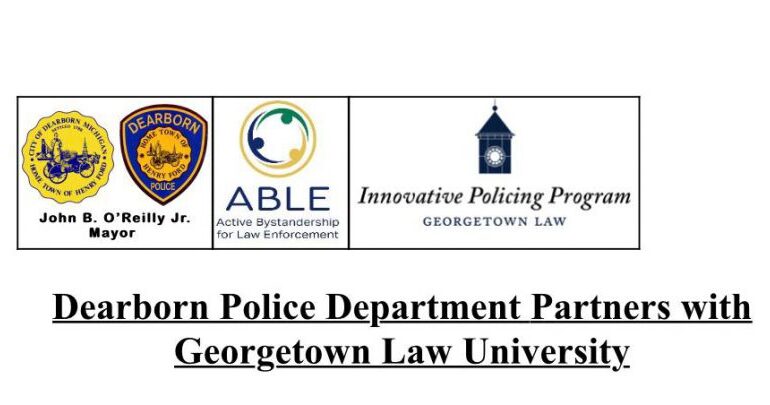DEARBORN — The Dearborn Police Department was accepted into the Active Bystandership for Law Enforcement (ABLE) Project by the Georgetown University Law Center, also known as Georgetown Law.
The project is Georgetown Law’s national training and support initiative for U.S. law enforcement agencies committed to building a culture of peer intervention that prevents harm.
The Dearborn Police Department joins a select group of about 30 other law enforcement agencies and statewide and regional training academies chosen to participate in the ABLE Project’s national rollout, out of more than 100 agencies that have expressed interest in the program.
With the support of civil rights and law enforcement leaders, the ABLE project was created by Georgetown Law’s Innovative Policing Program in collaboration with global law firm Sheppard Mullin LLP to provide practical active bystandership strategies and tactics to law enforcement officers to prevent misconduct, reduce officer mistakes and promote health and wellness.
ABLE offers officers the tools they need to overcome the innate and powerful inhibitors they may face when called upon to intervene in actions taken by their peers.
Chief Ron Haddad said the inclusion in the project reflects the goals and priorities of the department as a whole.
“The Dearborn Police Department is committed to implementing policies and measures that are in line with national best-practices in policing,” he said. “By partnering with Georgetown University and the ABLE Project we will continue to be transparent and progressive in our quest to provide our citizens with the service and respect they deserve.”
Georgetown Law Innovative Policing Program Co-Director Christy Lopez said ABLE’s goal is to provide all police officers with the same opportunities.
“The ABLE Project seeks to ensure every police officer in the United States has the opportunity to receive meaningful, effective active bystandership training,” said Lopez, who is also a professor at Georgetown Law. “And to help agencies transform their approach to policing by building a culture that supports and sustains successful peer intervention to prevent harm.”
ABLE Project Board of Advisors Chair Jonathan Aronie, who is also a partner at Sheppard Mullin, said ABLE teaches skills everyone needs.
“Intervening in another’s action is harder than it looks after the fact, but it’s a skill we all can learn,” he said. “And, frankly, it’s a skill we all need – police and non-police. ABLE teaches that skill.”






Leave a Reply